Tajikistan — India Joint Statement issued during the State visit of President of India to Tajikistan
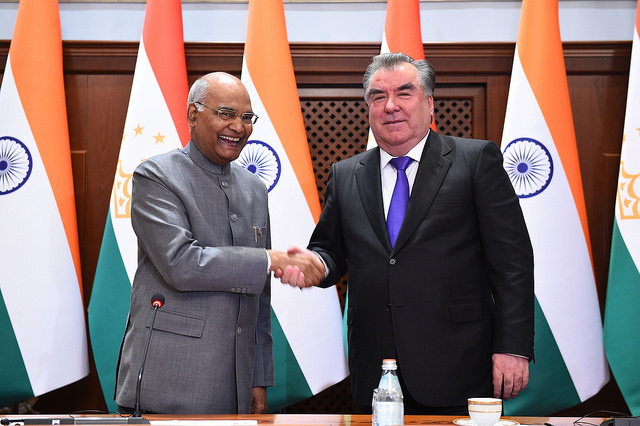
His Excellency Shri Ram Nath Kovind, President of Republic of India paid a State visit to Tajikistan on 7-9 October 2018 at the invitation of His Excellency Mr. Emomali Rahmon, President of Republic of Tajikistan. During the visit, the President of the Republic of India, His Excellency Shri Ram Nath Kovind and the President of the Republic of Tajikistan, His Excellency Mr. Emomali Rahmon met in restricted and extended formats. The Chairman of the Tajik Parliament — Majlisi Namoyandagon Majlisi Oli of the Republic of Tajikistan H.E. Mr. Shukurjon Zuhurov and the Prime Minister of the Republic of Tajikistan H.E. Mr. Qohir Rasulzoda also called on the President of India.
2. At the restricted meeting between the President of Republic of Tajikistan and the President of Republic of India, as well as at the delegation level talks led by the Presidents of both countries, which were conducted in the atmosphere of mutual understanding and trust inherent in both friendly countries, a number of issues of bilateral cooperation, as well as regional and international cooperation were considered.
3. The two leaders noted the deep ties between the two countries based on shared values of humanism, history, language, traditions, art and culture. They expressed satisfaction at the regular high-level exchange of views, mutual understanding and confidence and excellent level of cooperation achieved in the 26 years since the establishment of diplomatic relations between the two Republics. The two leaders reaffirmed their commitment to further expand and strengthen the strategic partnership for peace, stability, economic progress and prosperity of the two countries and the region.
4. The two leaders considered all existing official platforms of bilateral engagement, namely, Foreign Office Consultations, Joint Commission on Trade, Economic, Scientific and Technological Cooperation, Joint Working Group on Defence Cooperation, Consultations between Security Councils and Joint Working Group on Counter Terrorism important for timely implementation of bilateral agreements, decisions and mutually agreed programmes.
5. In view of rising threat of terrorism, religious fundamentalism, extremism and radicalisation to regional and global peace and security, the leaders stressed on cooperation in elimination of terrorism in all its forms and manifestations. They condemned sponsorship, financial support, assistance and provision of safe havens to terrorists anywhere in the world. They called for early adoption of the “Comprehensive Convention on International Terrorism” by the United Nations General Assembly, and reaffirmed commitment to step up bilateral and multilateral cooperation in the fight against terrorism, extremism and radicalization. In this context, the two leaders emphasized the need for close cooperation between the two security councils and security agencies of the two countries.
6. Acknowledging India’s heritage in being the birthplace of various religions, languages, cultures, as well as democratic values, the President of Republic of Tajikistan appreciated the efforts of India in combating radicalization and extremism. The President of Republic of India underlined the historic achievements of Tajikistan in preventing the spread of extremism and radicalization in its own territory and the region and in ensuring secular governance and progressive way of life rooted in Tajikistan’s rich culture.
7. Noting the most useful discussions in the meeting of Joint Working Group on Defence Cooperation in Dushanbe on 26 July 2018, the two leaders underlined the need for long term bilateral defence cooperation to contribute to regional peace and stability. The President of Republic of Tajikistan expressed gratitude for India’s assistance in capacity building and infrastructure development in defence and security and welcomed further contribution in capacity building for countering contemporary challenges and threats.
8. The two leaders noted the overall rise in bilateral trade in 2017, but reiterated that bilateral trade, investment and economic activities are not matching with the potential and rates of economic growth in the two countries. They called for stepping up of trade and economic cooperation, resolving difficulties in bilateral trade and investment. They appreciated the fruitful activities of the India-Tajikistan Joint Commission on Trade, Economic, Scientific and Technical Cooperation and Chambers of Commerce and Industries of India and Tajikistan. They took note of participation of Tajik traders and experts in significant numbers in trade fairs in India and visits of Indian trade and professional delegations to Tajikistan in 2016-18.
9. Underscoring the need for viable transport connectivity to achieve full trade and economic potential, the leaders agreed to work together with regional partners to establish necessary transport mechanisms based on international norms including respect for sovereignty and territorial integrity. In this regard, the two leaders emphasized the importance of regional efforts to expand transit and transport corridors that promote connectivity between Central Asia and India. Both leaders reiterated strong support to development of the International North-South Transport Corridor (INSTC) which will considerably reduce time and cost of transport of merchandise among India, Central Asia, Caucasus and CIS countries further north.
10. The two leaders emphasized the need for more regular flights between India and Tajikistan. The President of Tajikistan expressing gratitude for the Fifth Freedom Rights granted by the Indian authorities to Tajik air operators, called for more efforts to facilitate regular flights from both sides.
11. Taking into account existing potential, both leaders called for mutually beneficial investments in industry and agriculture. The leaders encouraged establishment of a Joint Business Council to explore and use the available opportunities to increase trade and investment in various fields, such as information technology and electronic devices, pharmaceuticals and biotechnology, weaving and textiles, silk and leather products, mining, hydropower and renewable energy. The President of Republic of Tajikistan invited Indian investments in free economic zones in Tajikistan.
12. The leaders noted with satisfaction significant increase in people to people contacts and cultural and educational exchanges. The President of India reiterated India’s commitment to developing human resources and capacity building under Indian Technical and Economic Cooperation (ITEC) Programme, university scholarships offered by the Indian Council for Cultural Relations (ICCR) and other training and education programmes. Both leaders emphasized the cultural affinity between the two countries and noted significance of the Cultural Exchange Program (CEP) 2016-18 for training programmes and other activities.
13. The two leaders agreed on implementation of joint projects in the field of peaceful uses of space technology. In this regard, the Indian side expressed its readiness for rendering training and technical assistance to Tajikistan.
14. The two leaders called for enhancing cooperation in the fields of science and technology including information technology, solar energy, laser technology and industrial automation. The President of Republic of Tajikistan expressed gratitude for India’s readiness to implement solar projects in Tajikistan.
15. The two leaders agreed that the commemoration of memory of the great Tajik poet, Hero of Tajikistan, Mirzo Tursunzoda, who wrote eloquently about India and praised the friendly relations of the people of Tajikistan and India will contribute to strengthening of cultural relations between the two countries.
16. The two leaders, underlining their common interest in promoting peace and stability in Afghanistan, expressed their support to Afghan-led, Afghan-owned and Afghan controlled peace and reconciliation process with participation of all ethnicities of Afghanistan. They expressed concern on the security situation in Afghanistan and the high level of violence caused by all terrorist groups. Tajikistan and India will continue bilateral and multilateral cooperation in promoting peace and stability in Afghanistan. The President of Tajikistan appreciated the positive role being played by India in extending development assistance to Afghanistan, including for building social and economic infrastructure, governance institutions and human resource development and capacity building.
17. The President of Tajikistan and the President of India acknowledged the active participation of India as a full-fledged member of SCO. Both leaders underscored the importance of SCO and reaffirmed commitment to working within the framework of SCO for common economic development and security.
18. Expressing strong commitment to multilateralism and reaffirming the central role of United Nations (UN) in dealing with the global challenges and threats, the two leaders called for comprehensive reforms of UN structures to make it more representative and reflective of contemporary realities. The President of Republic of Tajikistan reiterated Tajikistan’s support to India’s candidature for permanent membership of an expanded UN Security Council.
19. The President of Republic of India appreciated the initiative of Tajikistan on International Decade for Action “Water for sustainable development, 2018-2028” and called the High-Level Conference held in Dushanbe on June 22, 2018, as the next global level step to achieve sustainable development. In this context, he pointed out national flagship programmes in India, such as Swachh Bharat (clean India), Namami Gange (clean Ganga project), Pradhan Mantri Krishi Sinchayee Yojna (Prime Minister’s Agricultural Irrigation Scheme) etc. which aim at cleaning water resources, sanitation and access to clean water.
20. The President of India announced allocation of a grant of USD 20 Million to Tajikistan for implementation of mutually identified and viable development projects. The President of Tajikistan thanked President of India for the assistance.
21. During this visit the following documents were signed on 8 October 2018 and announced in the presence of the two Presidents:
I. Memorandum of Understanding between the Government of the Republic of Tajikistan and the Government of the Republic of India on Cooperation on Peaceful Use of Space Technology for Development.
II. Memorandum of Understanding between the Government of the Republic of Tajikistan and the Government of the Republic of India on Cooperation in the field of Disaster Management.
III. Memorandum of Understanding between the Ministry of Energy and Water Resources of the Republic of Tajikistan and Ministry of New and Renewable Energy of the Republic of India on Cooperation in the Field of Renewable Energy.
IV. Memorandum of Understanding on Cooperation in Youth matters between the Committee on Youth Affairs and Sports under the Government of the Republic of Tajikistan and the Ministry of Youth Affairs and Sports of the Republic of India.
V. Memorandum of Understanding between Academy of Agricultural Sciences of the Republic of Tajikistan and Indian Council of Agricultural Research (ICAR), New Delhi, India for Cooperation in Agricultural Research and Education.
VI. Memorandum of Understanding between State Educational Establishment “Tajik State Medical University named after Abuali Ibn Sino” and the Central Council for Research in Unani Medicine, an Organization under the Ministry of AYUSH, Government of the Republic of India on Cooperation in Unani Medicine.
VII. Programme of Cooperation between the Ministry of Foreign Affairs of the Republic of Tajikistan and the Ministry of External Affairs of the Republic of India for the period 2018-2021.
VIII. Cultural Exchange Programme between the Ministry of Culture of the Republic of Tajikistan and the Ministry of Culture of the Republic of India for the Years 2019-2023.
The Centre for Strategic Researches under the President of the Republic of Tajikistan and Vivekananda International Foundation, New Delhi also concluded a Memorandum of Understanding.
22. The President of Republic of India H.E. Shri Ram Nath Kovind thanked the President of Republic of Tajikistan H.E. Mr. Emomali Rahmon and the people of Tajikistan for the warm and friendly reception and excellent hospitality accorded to him and his delegation. The President of Republic of India H.E. Shri Ram Nath Kovind invited the President of Republic of Tajikistan H.E. Mr. Emomali Rahmon to visit India at a time convenient to him. The invitation was accepted with pleasure.











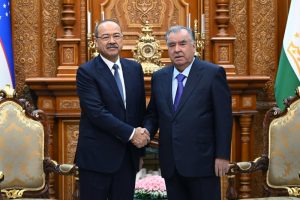 President Emomali Rahmon Receives the Prime Minister of the Republic of Uzbekistan Abdulla Aripov
President Emomali Rahmon Receives the Prime Minister of the Republic of Uzbekistan Abdulla Aripov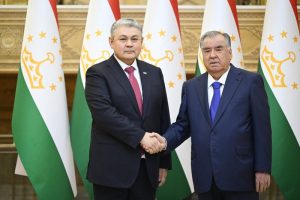 President Emomali Rahmon, Received the Minister of Foreign Affairs of the Republic of Kazakhstan
President Emomali Rahmon, Received the Minister of Foreign Affairs of the Republic of Kazakhstan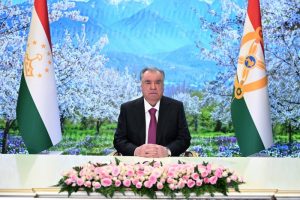 President Emomali Rahmon Sends Festive Greetings to President Xi for Chinese New Year
President Emomali Rahmon Sends Festive Greetings to President Xi for Chinese New Year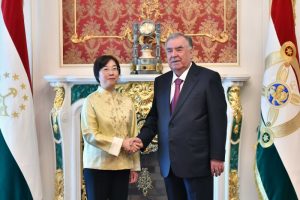 President Emomali Rahmon Receives AIIB President Zou Jiayi in Dushanbe
President Emomali Rahmon Receives AIIB President Zou Jiayi in Dushanbe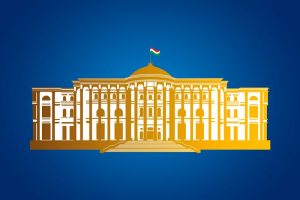 President Emomali Rahmon to Hold Series of Meetings in the Coming Days
President Emomali Rahmon to Hold Series of Meetings in the Coming Days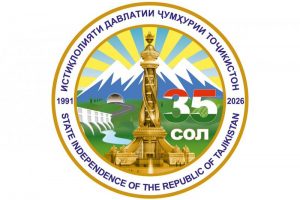 President Emomali Rahmon Approves Emblem for the 35th Anniversary of Tajikistan’s State Independence
President Emomali Rahmon Approves Emblem for the 35th Anniversary of Tajikistan’s State Independence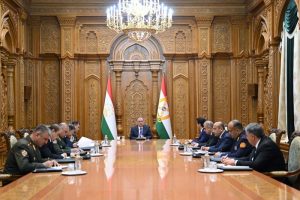 President Emomali Rahmon Holds Working Meeting with Heads of Security and Law Enforcement Agencies
President Emomali Rahmon Holds Working Meeting with Heads of Security and Law Enforcement Agencies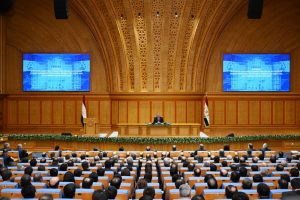 Expanded meeting of the Government of the Republic of Tajikistan
Expanded meeting of the Government of the Republic of Tajikistan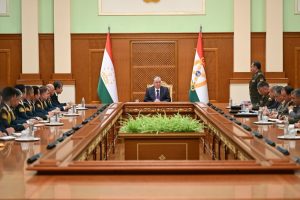 President Emomali Rahmon makes personnel appointments
President Emomali Rahmon makes personnel appointments














